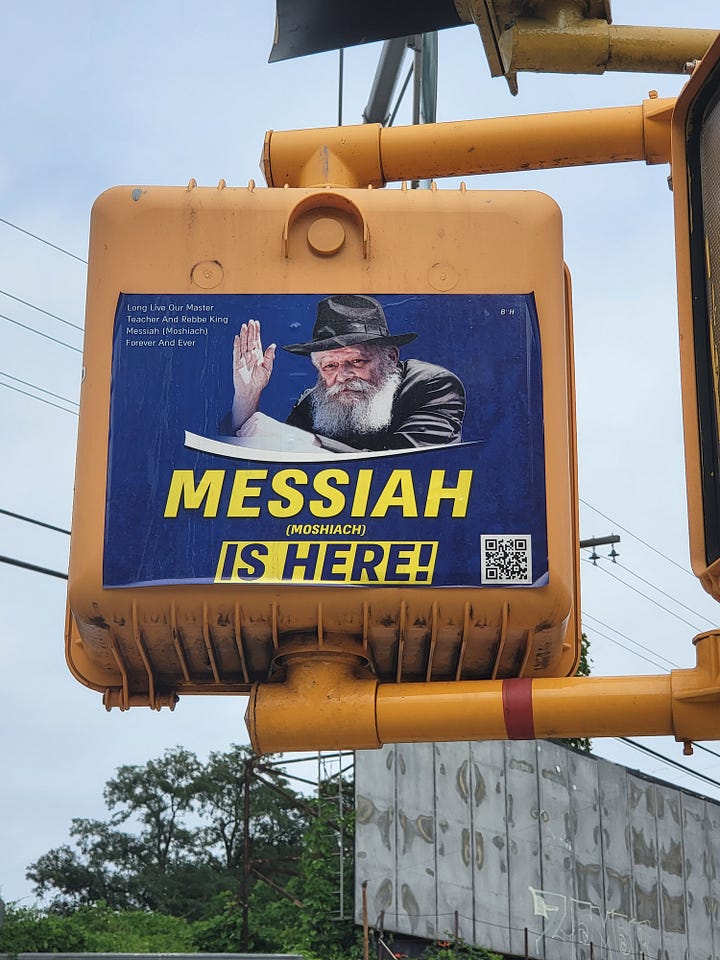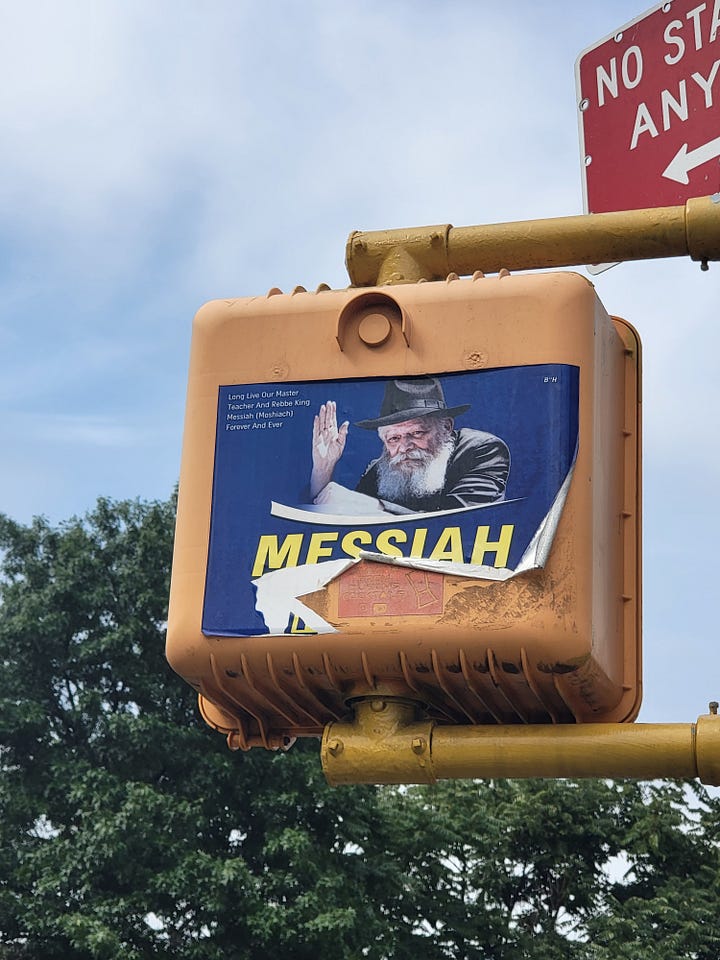Below is part two of my paywalled prayer. God’s responses to part one are behind the paywall, but I’m also happy to share the responses privately with my podcast guests. If you’d like to be a guest on one of my podcasts, please complete this form.
In addition to God’s responses, I received a response from someone — I believe a flesh-and-blood human — who appeared offended by my attempts to monetize God. I have a simple message to all who share this sentiment: become a paying subscriber to DaaS and bring your sentiment into dialogue. This way, you can be an instrument of God’s will.
Dear God
Thank you for your responses to the first part of this prayer. I'm still processing some of your guidance, but I'm also already taking action to help you help me.
Most importantly, I'm delighted that we have at least opened a line of communication. When I started this prayer, I wasn’t even sure that I would hear back from you, but we’ve now established that we hear each other. I think that’s a huge milestone in our relationship, a proof of principle. With your continued engagement in this dialogue, I anticipate an acceleration in my journey to the land flowing with milk and honey.
Now feeling refreshed after my vacation, I’m still brimming with gratitude for your first round of responses. But I’m also asking for another round. Don’t get me wrong, God. I’m not asking for step-by-step instructions. I know that’s not your style. But I want to at least avoid translational and scribal errors. A bit more specificity would be very helpful, both to me and my subscribers.
In the first part of my prayer, I was specific about what I want and need. I even included a specific metric — paying subscribers — and a specific goal: to attract ten of them by September 25, 2024. I also proposed a specific mechanism — the paywall — through which you could answer my prayer by removing this obstacle for the members of my first DaaS quorum.
If you don’t like the specific mechanism I proposed, no big deal; please choose any other mechanism you like. However, God, I must re-emphasize the metric and the goal. I express this emphasis as a cri de coeur: Show me the money!
In addition to Jerry Maguire’s appeal, I quote Lisa (Marisa Tomei) from My Cousin Vinny:
My biological clock is ticking like this!
Translating metaphor into matter can be a glitchy process, and I’m eager to work through the glitches with you. To start, I intend to return to Marshall McLuhan's Understanding Media: The Extensions of Man. This time, I will start the reading with the chapter on money.
The problem is that reading is a slow-acting medicine, and understanding media is the work of a lifetime. I’m happy to dedicate the rest of my life to the quest for this understanding, but here and now, I turn to you with a more basic and urgent need for both economic and creative sustenance.
For the satisfaction of this need, I have metrics and deadlines. To me, it may seem unrealistic that DaaS would attract ten paying subscribers in less than a month. That’s why, I’m writing a letter to the omniscient and omnipotent God.
God, thank you for introducing me to Signal Detection Theory (SDT) during my college years. SDT has helped me greatly in distinguishing medicine from snake oil and your signals from the noise in my media. Thanks to this discernment, I know that, sometimes, you’re just testing me to make sure I’m paying attention.
For example, when you displayed a familiar message during my one of my daily walks, I knew the message was noise, not signal. The message was irreducible to the text of the Chabad ad posted on the back of a traffic light. The text of the ad merely proclaimed that “Messiah is here”. However, through a context-sensitive reading of the message, I knew you were simply telling me to avoid snake oil at all costs. Precisely because I am determined to avoid snake oil, I turn for sustenance to the words of the One True God (OTG).


A similar reflection arises in my mind when Chabad missionaries stop me in the street with a painfully familiar question: “Excuse me, sir. Are you Jewish?”
Over the years, I've responded to this question in countless ways. None of these responses matter as much as the recognition of the main problem in my communications with these missionaries. The problem is that we are separated by a difference rooted in the biology of language, and the clearest obstacle to Jewish unity is the failure to honor this difference.
I envision a near future in which I interview a Chabad rabbi on my BS”D podcast. I’ll tell my guest whether I’m Jewish if my guest first answers the central question of the podcast: What is a Jew?
If you are a Chabad rabbi who would like to appear as a guest on BS”D, please fill out my podcast guest form.
Pardon the digression, God. Let’s get back to metrics and goals.
I've said a lot about money since I started publishing on Substack, and it's time to say more. The question people naturally ask themselves about money is “Why am I not making more?” In my view, a more fruitful question is “How did I make the money that has sustained me thus far?” or “How did I get to breathe another day?”
The biggest money problem people try to solve is a pseudo-problem created by a misguided question. In a way, it's the ultimate pseudo-problem. We think we're trying to figure out how to make more money, but the problem is already solved. We've been making money all this time, and we made enough money to live to fight another day.
The problem is solved, and the real need is a new theory of value. The problem was never and how much money I make. The problem was always in the sustainability of my ways of making money. As many people are learning now, more and more ways of making money are becoming obsolete. They don't work. The way I made money for more than two decades in my corporate career no longer works. Replacement by forces we pretend to understand is not a risk looming on the horizon. It’s a pattern we observe in the rearview mirror. Recognition of this pattern leads to renegotiations of the idea of value at the heart of every economic transaction, every exchange of goods and services. So, I undertake this renegotiation as a participant in the creator economy.
Sometimes I joke that I would definitely receive the Nobel Prize as soon the Nobel Committee establishes a category in which my work merits the prize. I only use the Nobel Prize for purposes of illustration. I don't really care how I receive recognition and remuneration for the value of my work. In fact, I would prefer to earn a living through subscription income on Substack, where I can create and re-create my own categories.
It’s no secret Why It Pays to Be a Category Creator. But the reality of the inestimably large creator economy is that the path to the payoff presupposes a revolution leading to altered states of monetary consciousness. Even though this revolution seems increasingly inescapable, I’m not holding my breath. Instead, I continue my paywalled prayer.
For now, dear God, I feel I’ve taken enough of your time. Thank you again for your attention and generosity. I’ll conclude this addition to my prayer with a preview of the final installment in this series, where I’ll cover:
What happens after September 25, 2024?
Capital allocation
Risk management
Attracting podcast guests
Technical difficulties
The meaning of milk and honey
Dear Subscriber
Part of what will happen after September 25, 2024 is what's already happening: what I publish on Substack increasingly reflects not only my interests, but also the interests of my podcast guests. If you can't yet afford to serve God's will by becoming a paying subscriber, consider joining me as a guest on one of my podcasts. In addition to a discussion organized around one of my four questions — What’s your story? What’s your problem? What are you hearing? and What is a Jew? — you'll receive a special bonus: A personalized summary of God's responses to my paywalled prayer.



